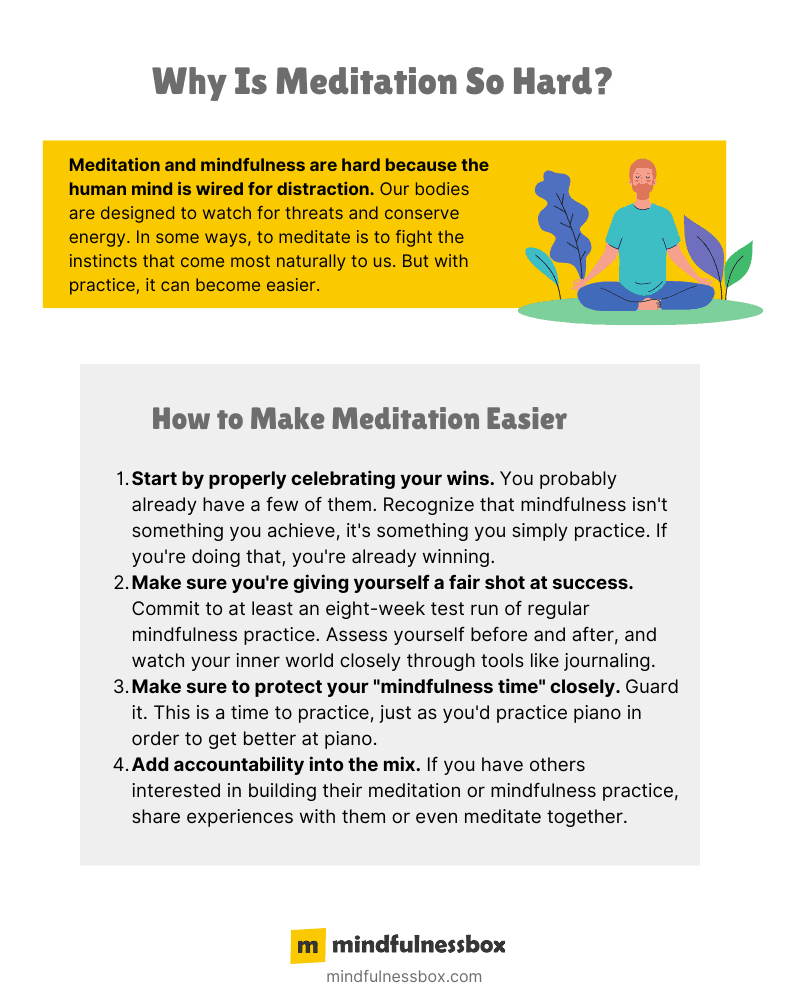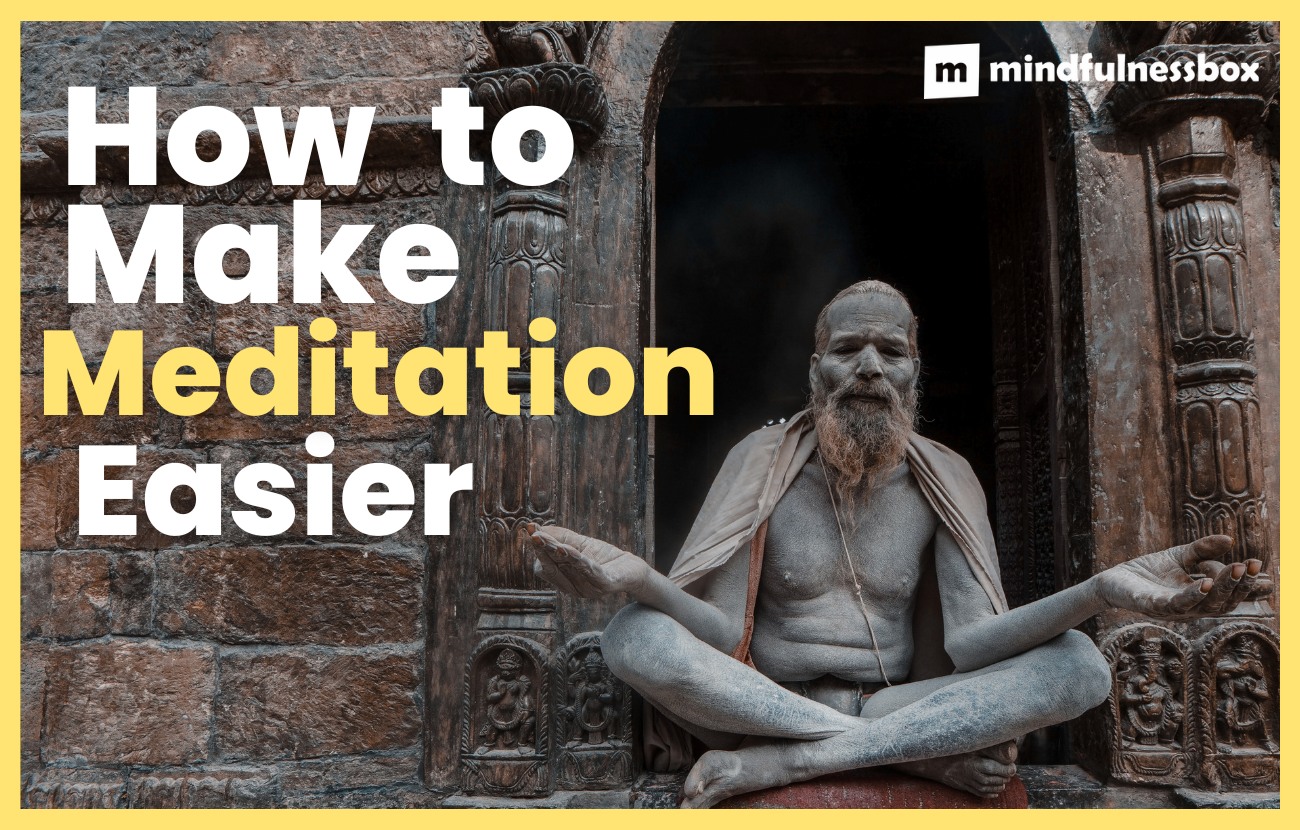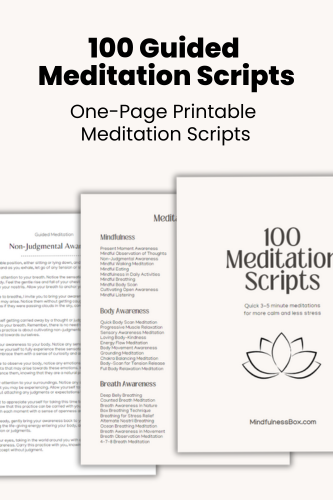Most of us feel like we “fail” at meditation as soon as we get distracted. But the truth is, that’s what meditation is about: getting distracted and then coming back to the present moment. Without distraction, the exercise wouldn’t work. In this article, I’ll discuss why “failing” at meditation is necessary along the path to success.
Mindfulness isn’t easy.
These 100 meditation scripts were created to help beginner and intermediate meditators practice key mindfulness concepts like self-love, forgiveness, gratitude, and inner peace.
Designed to fit into busy schedules, each meditation script lasts 3-5 minutes. Perfect for starting or closing a group meditation; for yoga, coaching, or therapy sessions; or for your personal meditation practice.
The human mind is wired for distraction. Our reptile brains are forever on the lookout for noises to be analyzed for signs of threats. Our Pavlovian instincts keep us scrolling social media for digital treats and puttering around the kitchen for physical ones. Our brain tries to conserve energy by taking the laziest path, every time.
We have a million instincts wiring us for survival, perfect for a world where the major threats were saber-toothed tigers.
But not so perfect for a world where major threats include heart attacks, anxiety and depression, and where we’re looking for peace and calm to survive.
With meditation and mindfulness, we’re fighting an uphill battle against our own nature.
Why is meditation hard?

The world is brimming with people who will tell you that mindfulness is a good thing.
So naturally, at this point, there are people out there who just don’t like mindfulness. It’s an easy position to understand, especially for anyone who’s tried it and felt like “it wasn’t for you.”
Sometimes, people new to mindfulness (or even experienced practitioners) just aren’t “feeling anything.” They find it difficult to focus, and feel like they’re not doing it right, leading to frustration, and finally, to giving up.
Often, the challenge here is a misalignment of expectations.
We want mindfulness to be easy: something we pick up in a weekend, and then deploy like a jedi mind trick any time we hit an emotional speed bump.
The reality is a little different.
How to make meditation easier (in 5 steps)
There’s no quick fix to make meditation easy. But there are principles to keep in mind: primarily, patience and consistency. By following these five steps, you’ll give your meditation habit a better chance of succeeding.
1. Give your meditation habit time to develop
If you feel like meditation doesn’t work for you, the most common scenario is this:
It will. It just hasn’t yet.
James Clear has an appropriate analogy about progress in his book Atomic Habits.
Consider trying to melt an ice cube:
You heat it up to 20 degrees Fahrenheit, then 23, then 27, and finally 31. Nothing happens. You’ve “failed” to melt the ice cube.
Then later, you come back and try once more, from 31 to 32, and the ice cube melts. Now you’ve succeeded, but you couldn’t have without all the work that came before it.
With your meditation habit, you’re slowly melting away your old patterns and joining neurons in new ways. You’re layering on new ways of interpreting the world and observing yourself. You’re making progress that you have no way of seeing yet, until one day, you look back and realize:
“I get upset a lot less than I used to. Huh.”
2. Read meditation and mindfulness studies
The evidence tells us that meditation works. Use that to motivate you.
Whether you’re attracted to mindfulness to help with anxiety, depression, stress or many other ailments, there are studies showing the strength of mindfulness-based approaches toward relief.
A few proven benefits from studies:
- In 2013, 93 people with anxiety disorder were studied. Those among them that went through an eight-week Mindfulness Based Stress Reduction program reported significantly less anxiety
- Similar results in stress reduction have been seen on specific studies of groups as diverse as parents, police officers, veterans, healthcare professionals, and those with restless leg syndrome
- A study by Harvard University of 2,250 subjects found that their happiness was greatly influenced by how present they were, rather than what they were doing in a given moment
3. Watch for meditation milestones along the way
In order to see the full effects of mindfulness, it’s important to be patient and consistent with your practice. Some people may find that it takes a while for mindfulness to start working. Others experience changes relatively quickly. The important thing is to be mindful of your own experience and not compare yourself to others.
The best way to look at mindfulness is as a lifelong journey.
But as a benchmark, you may consider an eight-week “sprint.”
Studies that have been done have tended to observe people going through eight-week stretches of mindfulness intervention.
Common scenarios for mindfulness studies include weekly group classes and daily mindfulness exercises over an eight-week period.
So to give yourself the greatest chance of seeing results that you can notice, consider committing to eight weeks of consistent practice, and then reassessing.
For more, read our article on how long meditation takes to work.
4. Remember that when you notice your mind wandering, that’s success (not failure)
If you’re getting frustrated, meditation is probably working.
Often, new meditators feel that after spending a session with racing thoughts and a distracted mind, they’ve somehow failed.
In reality, each time you notice that your thoughts have raced away from the present, you’ve succeeded. Meditation is simply noticing when you’ve left the present, and pulling yourself back to it.
The intervals where your mind is wandering will be long at first, and then shorter and shorter. Each time you “fail” by realizing you weren’t present, you’ve actually succeeded… by realizing you weren’t present.
You’ll also want to watch your own experience carefully. Pay attention to your inner world, your emotions and your reactions, and notice any changes that may occur. Be patient, as the effects of mindfulness can take time.
It may help to journal, reflecting on both a short time frame (your day-to-day experience) and a long time-frame (where you are now, versus where you were when you started your mindfulness practice).
5. During difficult times, put your mindfulness practice into action
Sometimes, the times you most need mindfulness are the times it’s hardest to access. Mindfulness is built in the course of your practice, so keep at it to build resilience for future challenges.
Make sure you’re taking time for yourself every day, even if it’s just 10 or 15 minutes.
Treat this time as sacred. During this time, put your phone on do not disturb mode and try meditating, writing in a gratitude journal, or reflecting on your inner experience.
If you’re struggling in difficult moments, consider these tips:
- Pause before responding: Slow down your responses in heated moments, to give yourself time to think through what you’d like to convey. It’s even okay to say “I need a moment to respond” or “Give me a second to think about how I feel about that”
- Take a break: When needed, take a break from a situation that’s become overwhelming to you. If there are others involved, explain to them that you need a moment, or excuse yourself to go to the bathroom.
- Box breathing: Breathe in for four seconds, hold for four seconds, exhale for four seconds, and repeat as needed. This can reduce stress by bringing your nervous system back into balance, especially if you’ve moved into a fight-or-flight state.
- Journal: Sometimes when we’re struggling, our brains are so cloudy we lose track of our emotions. The mere act of identifying what we’re feeling can help.
How to make meditation easier
Mindfulness hard to master, but easy to start. So start with bite-sized chunks.
The first step is to understand the size of the problem you’re tackling.
You’re not learning mindfulness in a weekend. You’re not becoming an expert meditator overnight.
You’ll probably live with a busy, noisy brain for some time, and you may not see effects on your anxiety, stress or other issues right away.
That’s okay.
Mindfulness is a lifelong tool, and it will probably “feel” a lot like failure at the beginning. Our brains are wired to pull us out of the present moment. This is normal.
Here are some ways to make meditation easier:
- Start by properly celebrating your wins. You probably already have a few of them. Recognize that mindfulness isn’t something you achieve, it’s something you simply practice. If you’re doing that, you’re already winning.
- Make sure you’re giving yourself a shot at success by committing to at least an eight-week test run of regular mindfulness practice. Assess yourself before and after, and watch your inner world closely through tools like journaling.
- Make sure to protect your “mindfulness time” closely. Guard it. This is a time to practice, just as you’d practice piano in order to get better at piano.
- Add accountability into the mix. If you have others interested in building their meditation or mindfulness practice, share experiences with them or even meditate together.
By seeking to improve some aspect of your condition, you’ve already started the journey.
And it will last a lifetime.
Further reading
For more on meditation, check out the following articles.
- How Long Does Meditation Take to Work?
- How Long Should You Meditate?
- 5 Signs of Progress in Meditation

My mindfulness practice kicked off in 2016 with a ten-day silent retreat. Since then, I’ve read dozens of books about mindfulness and completed hundreds of hours of meditation. Thinking about what makes humans happy, calm, and peaceful is endlessly fascinating to me.


